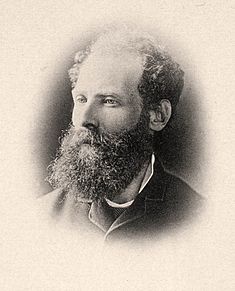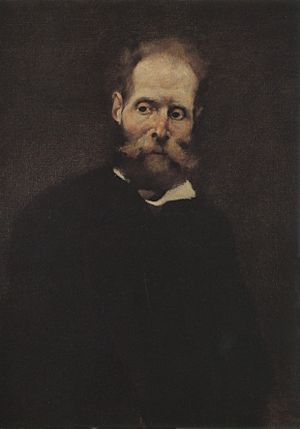Antero de Quental facts for kids
Antero Tarquínio de Quental (born April 18, 1842 – died September 11, 1891) was a famous Portuguese poet, thinker, and writer. Many people consider him one of the greatest poets of his time. He is also seen as one of the most important Portuguese-language artists ever. His name is often mentioned with other famous writers like Luís Vaz de Camões and Fernando Pessoa.
Contents
Biography
Early Life and Childhood
Antero de Quental was born in Ponta Delgada. This city is on São Miguel, one of the Azores islands. His family was very old and well-known in the area. His father, Fernando de Quental, was a soldier who fought in the Liberal Wars in Portugal. Antero's mother, Ana Guilhermina da Maia, was a very religious person.
Antero started writing poetry when he was young. He mostly wrote sonnets, which are poems with 14 lines. As a child, he learned French from António Feliciano de Castilho. Castilho was a big name in Portuguese Romantic poetry. Even though Castilho taught him, Antero later disagreed with his ideas. This led to a big argument between them.
When Antero was seven, he went to a private school called Liçeu Açoriano. There, he learned English. In 1852, Antero moved to Lisbon with his mother. He studied at Colégio do Pórtico, where Castilho was the headmaster. After that school closed, Antero went back to Ponta Delgada in 1853.
Later in his life, Antero focused on poetry, politics, and philosophy. By 1855, when he was 16, he returned to Lisbon. Then he went to Coimbra and finished school at Colégio de São Bento in 1857.
Years in Coimbra
In 1856, Antero started studying law at the University of Coimbra. There, he became interested in socialist ideas.
He quickly became known for his writing and speaking skills. He was also known for being a bit rebellious and unique. In Coimbra, he started a group called Sociedade do Raio. This group wanted to share literature with more people.
In 1861, Antero published his first sonnets. Four years later, he published Odes Modernas. This book showed his ideas about social change and revolution. It was influenced by the ideas of Proudhon.
In 1865, a big argument started among poets and students. It was called the Questão Coimbrã (Coimbra Question). The older poets, led by António Feliciano de Castilho, had traditional ideas. A group of younger students, including Antero de Quental, Teófilo Braga, and Eça de Queirós, wanted new ideas. Castilho said the students lacked good sense and taste.
Antero de Quental wrote books like Bom Senso e Bom Gosto to defend his group. He said poets should speak about important ideas of their time. He also criticized Castilho's poetry for being too simple. Antero's group became known as the "70s Generation."
Later Life and Activism
After the Coimbra Question, Antero traveled a lot. He got involved in politics and socialist movements. He faced many challenges, which made him feel a bit sad and thoughtful. This new way of thinking, however, made his poetry deeper and more meaningful.
In 1866, he moved to Lisbon. He tried working as a typographer (someone who sets type for printing) at the National Press. He even did this job in Paris for a short time to support French workers.
He briefly visited the United States but came back to Lisbon in 1868. In Lisbon, he formed an intellectual group called Cenáculo with friends like Eça de Queirós. This group challenged many old political and social rules.
In 1869, Antero started a newspaper called A República. In 1872, he helped edit a magazine called O Pensamento Social. In 1871, he organized famous "Conferências do Casino" (Casino Conferences). These meetings helped spread socialist ideas in Portugal. Antero was a strong supporter of republican ideals, which meant he wanted Portugal to be a republic, not a monarchy. He even ran for office twice with the Portuguese Socialist Party.
In 1873, Antero inherited a lot of money. This allowed him to live comfortably. The next year, he rested due to health issues. He later re-edited his Odes Modernas. In 1879, he moved to Oporto, Portugal. In 1886, he published what many consider his best poetry book, Sonetos Completos. This book contained many poems about his own life and feelings.
In 1880, he adopted the two daughters of his friend, Germano Meireles, who had passed away. Antero became very ill during a trip to Paris. In 1881, his doctor advised him to move to Vila do Conde. He stayed there until 1891, with some short trips to the Azores and Lisbon. He felt that his time in Vila do Conde was the best part of his life. He wrote to a friend that he wanted to stop writing poetry and start focusing on philosophy.
In 1886, his book Sonetos Completos was published. A Spanish writer, Miguel de Unamuno, called them "one of the greatest examples of universal poetry."
In 1890, Portugal faced a difficult situation with England, known as the English Ultimatum. Antero agreed to lead a group called Liga Patriótica do Norte (Northern Patriotic League) for a short time. He eventually returned to Lisbon and stayed with his sister.
Throughout his life, Antero struggled with his health and mood. He returned to Ponta Delgada in June 1891. He died on September 11 of that year.
Works
Antero de Quental's friend, Oliveira Martins, helped publish his Sonnets in 1886. He also wrote an introduction for the book. A collection of studies about Antero, called Anthero de Quental. In Memoriam, was published in 1896. Antero's sonnets have been translated into many languages, including English.
See also
 In Spanish: Antero de Quental para niños
In Spanish: Antero de Quental para niños
Images for kids
 | Claudette Colvin |
 | Myrlie Evers-Williams |
 | Alberta Odell Jones |



